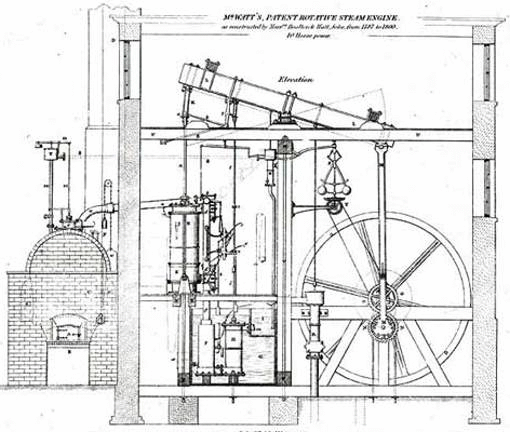 |
| Portrait of James Watt (1736–1819) by Carl Frederik von Breda photo: wikipedia |
On 19 January 1736 was born James Watt, inventor of the steam engine (d. August 25, 1819).
James Watt was born in the Scottish town of Greenock, Scotland, UK, in the family of a carpenter. In school he was interested in mathematical physics, other objects not having too brilliant results. He wanted to study at university but the family could not allow it. After much hesitation, it decided to learn precision mechanics items that in view of the precarious state of his health, it would not be exhausted.
He began studying at Glasgow, optics and mechanics in 1754. After just one year of teaching has gone to a manufacturer of mathematical tools, Morgan in London where he learned a lot and was highlighted by the precision and skill. which satisfied all her tasks incumbent.
In 1757, he obtained a place at the University of Glasgow as a mechanic. He found here a well stocked cabinet of physical conditions for further study and conduct experiments. The idea of steam engine began to preoccupy Watt after the first two years at university, at first without results.
When he was entrusted to repair the Newcomen's steam car model in 1765, it not only repaired, but it has also strived to improve his. He noticed that the steam from the boiler machine arrived only a few strokes of the piston, after the car had to wait until the boiler as steam again. It has focused on this issue for several weeks and found its solution: the steam not be formed directly in the cylinder, but separately, in another vessel bound for steam cylinder. Watt invented the condenser, heating cylinder valves at both ends, double-acting steam engine.
 |
| Engraving of a 1784 steam engine designed by Boulton and Watt. photo: wikipedia |
Due to financial problems, Watt is associated with Dr. Roebuck in 1769. It has been given a patent for the "new way of reducing steam consumption in cars, but the device built after the patent has not worked. The fault was not only imperfect seals the connections between different parts of the machine, but also the quality of material used. Watt was separated from his partner, who gave up his part of the bargain to Boulton manufacturer.
Watt found support for his experiences and inventions, soon becoming his partner in the new car factory "Boulton and Watt". Watt worked tirelessly to perfect the invention, which had caused so many disappointments.
In 1775 he managed to build the most important part - steam cylinder that really work so the factory managed to produce the first steam car and, after a year, two. The machines were a success and the factory is ready for production.
 |
| Scientific apparatus designed by Boulton and Watt in preparation of the Pneumatic Institution in Bristol photo: wikipedia |
For his merits, towards the end of life he received many honors. The most important are the fact that he was elected to the French Academy of Sciences, the Royal Society of London, doctor honoris causa of the University of Glasgow and others.
For his merits, towards the end of life he received many honors. The most important are the fact that he was elected to the French Academy of Sciences, the Royal Society of London, doctor honoris causa of the University of Glasgow and others.
Watt was married twice. First wife had five children, and the second two, who died at an early age. Shortly before his death on August 19 1819 and it has been awarded the title of nobility. Watt refused and remained faithful to its modest origins and creative work he loved above all.
The greatest accomplishment is considered to be the patent in 1784 of the steam locomotive.
Watt is the one who introduced measurement unit called horsepower, to compare different powers steam machines of the time and which was then equivalent to lifting 550 pounds in one second, or the equivalent of 745.7 watt unit the power measurement in the International system.
Other articles on the same theme:
Sources: Biography, Wikipedia
